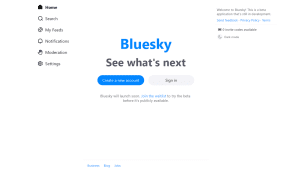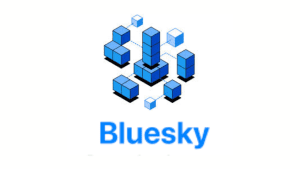
There has been a surge of interest in the new social app Bluesky, similar to Twitter, and competing with Mastodon which is decentralized and has some unique attributes that are usually related to web3 apps.
Bluesky Social is a social media platform that plans to provide users with a decentralized and user-centric experience.
Jack Dorsey, the Twitter founder is funding its development and has launched on Apple Services in February and is about to come to Android devices later.
Bluesky Social takes a different approach compared to traditional social media platforms.
It will use blockchain technology to give users more control over their data and privacy.
The forum operates on a decentralized network, meaning no central authority controls the data or content ensuring that users have ownership and autonomy over their personal information.

It is quite similar to Twitter, you can like, repost, and quote a post just like Twitter, and a notification tab to view mentions, replies, and new followers.
The profile view as well is also similar to Twitter, as you can see the interface, follower count, and bio.
What is Bluesky Social Media?
At the moment the developers of Bluesky Social have said the platform is still in its beta stage and have also made account creation to be invite-only.
Bluesky plans to become a decentralized alternative social media platform to Twitter where users can voice their opinions freely without fear of censorship or algorithmic biases.

What Jack Dorsey is trying to change or put in place with Bluesky is the ability of a social media platform to not just be controlled or owned by one person.
One major feature of Bluesky is that there are different servers that have the ability to create their own rules and regulations for their community, allowing for a range of user-driven communities with guidelines and structures that align with their specific values and interests.
We are still not sure of what it’s going to look like but from the news available to us, each server on Bluesky would create their own rules and users would decide if they want to join the community or not.
Does Elon Musk own BlueSky Social?

No. Jack Dorsey has a share of the biggest funding in Bluesky. At the moment, there has not been any accurate and verifiable news about who owns Bluesky.
The intention behind Bluesky is to collaborate with external experts, organizations, and developers to build an inclusive social media ecosystem.
Jack Dorsey founded Twitter in 2006 aiming to become one of the world’s most-used social media platforms.
But, in 2021, after the pandemic hit, Jack Dorsey sold Twitter and everything connected to the Bird app to businessman, Elon Musk, for $44 billion.
After the sale, Jack Dorsey launched a test version of his new app called Bluesky (a web3 alternative to Twitter) for persons who wanted to have a feel of what it is like to be in a decentralized social media platform.

See also: What Happened to the Mark Zuckerberg Metaverse?
Is Bluesky Social available?
Although BlueSky hasn’t fully launched to the public, a beta invite-only version of the app is available to iOS and Android users who would like to try out the app.

To join Bluesky, you must have an invite code from a user that has already created and wants to share it with you.
How do I get a Bluesky social invite?
To get an invite code to sign up for BlueSky Social, you must use an invite code from an active user on the platform to sign up for your own account.
The site is in beta, and is not letting everyone join yet until the development phase is fully over.
See also: How To Pair Oculus Quest 2 To Phone
Early Reviews
Bluesky Social has been called an alternative, replacement, and substitute for Twitter which looks like the early stages of Twitter.
At first glance, the two platforms look very similar. The profiles, colors, and layout all look like Twitter and this is just one of the major similarities.
Critics have noted that since Musk took over Twitter, the platform has been plagued with bugs, glitches, and controversies like removing the blue check marks and other privileges.
BlueSky Social has gotten some positive reviews as well as negative ones from users around the world.
Some users have said that BlueSky “is their favorite Twitter clone yet” while others say that it is going to be a failure in the coming years since no one actually asked for it.
But what does the future actually hold for BlueSky Social?
The Future of BlueSky Social

The future of Bluesky Social holds immense potential for growth and innovation, as it embraces the emerging technology of decentralization and leverages its strong community to become a leading platform for social interaction and content creation.
Bluesky Social’s success will rely on its ability to nurture a vibrant and engaged community. Also, by implementing features that facilitate meaningful interactions, such as live streaming, collaborative content creation, and interactive events, they can strengthen user connections and drive the platform’s growth.
In an era where content is king, Bluesky Social must empower its users to create and discover compelling content.
Enhancing content creation tools, offering monetization opportunities, and employing AI algorithms for personalized content can foster a creator ecosystem and attract a diverse user base from other social networks.
By following the early footsteps of Twitter, partnering with influential creators and thought leaders within various niches can amplify Bluesky Social’s reach and attract a wider audience.
If the company can be able to use the influence of these individuals, Bluesky Social can gain a wide reach and attract a larger audience of unique people across the world.
Web3 Applications
The internet has transformed our lives, but it also has its limitations, including centralized control, privacy concerns, and data ownership issues.
Web3 applications aim to overcome these challenges by leveraging blockchain technology and decentralization principles to create a more open and user-centric digital ecosystem.
The future for Web3 applications is highly promising, as it revolutionizes the way we interact with the internet by offering decentralized, secure, and transparent experiences that empower individuals and reshape industries.